People have expanded their definitions of health in 2023, with mental health supplanting physical health for the top-ranked factor in feeling healthy.
Welcome to the Edelman Trust Barometer Special Report: Trust and Health, released this week, with striking findings about how the economic, post-pandemic life, pollution and climate change all feed mis-trust among citizens living in 13 countries — and their eroding trust for health care systems.
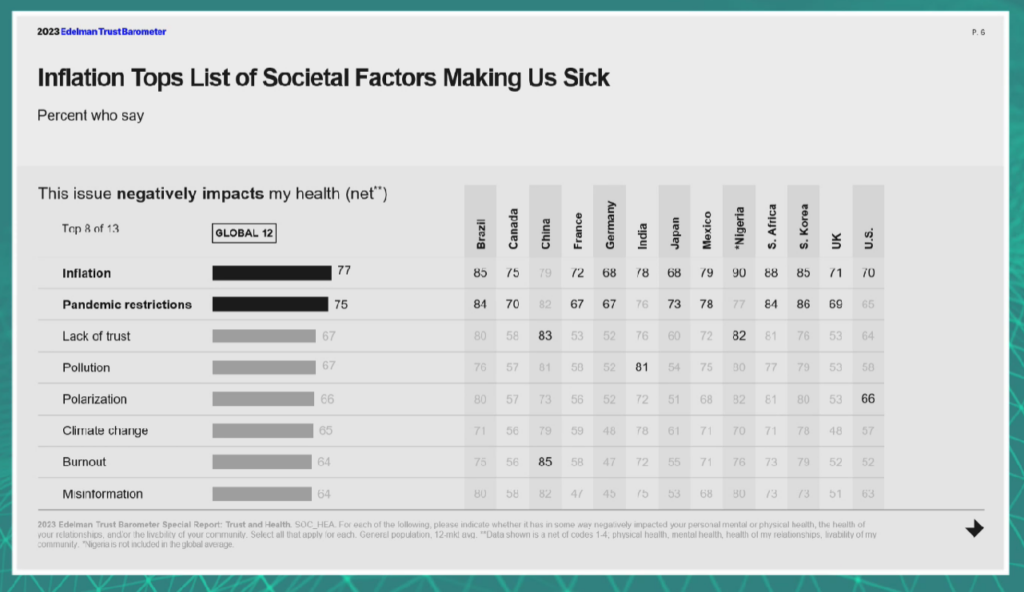
While these factors vary by country in terms of relative contribution to citizen trust, note that in the U.S., social polarization plays an outsized role in factors that “make us sick” compared with other nations Edelman studied.
Inflation and economic fears and polarization are the two key drivers underpinning Americans’ malaise, the first chart illustrates.
And for people earning low incomes, it’s no surprise that they are far less likely to report good health: here, health equity and disparities play out with respect to a key social determinant of health, income and job security.
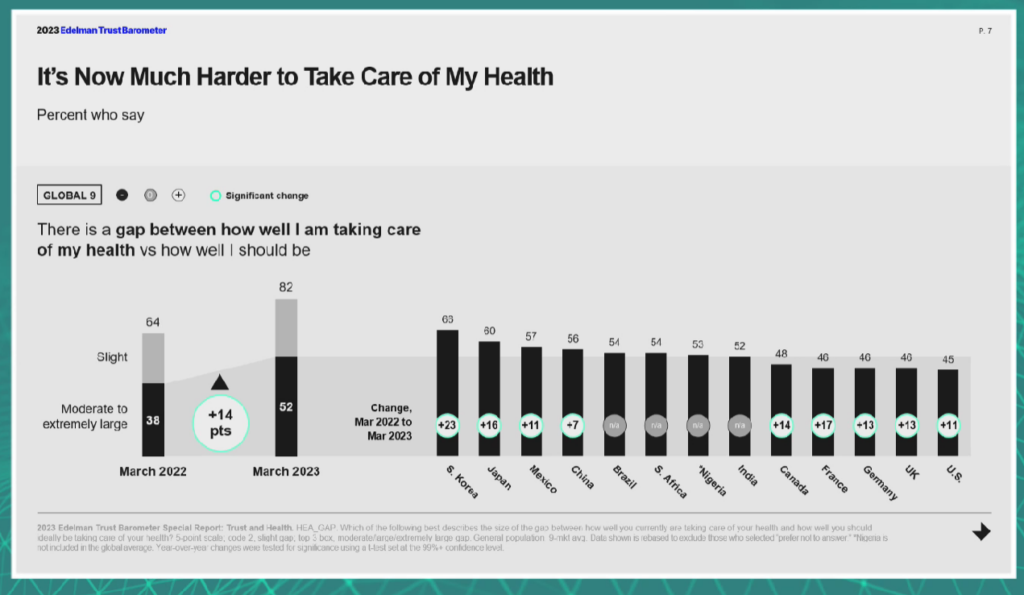
In 2023, it’s much harder to take care of my health, consumers say. Globally, the gap between how well I am taking care of my health versus how well I “should” be doing has grown by 14 percentage points (worse) in the past year, comparing March 2022 to March 2023.
In the U.S., that delta is 11 points worse, the second chart graphs, with the U.S. datapoint shown to the far right.
Given the economic angst across the world, and indeed in the U.S., the biggest barriers to better health are (1) cost and (2) information, the Edelman research discovered. Cost plays a large role in health in that healthy options cost too much, or people perceive they cannot afford to pay for their health care services or treatments (read: prescription drugs).
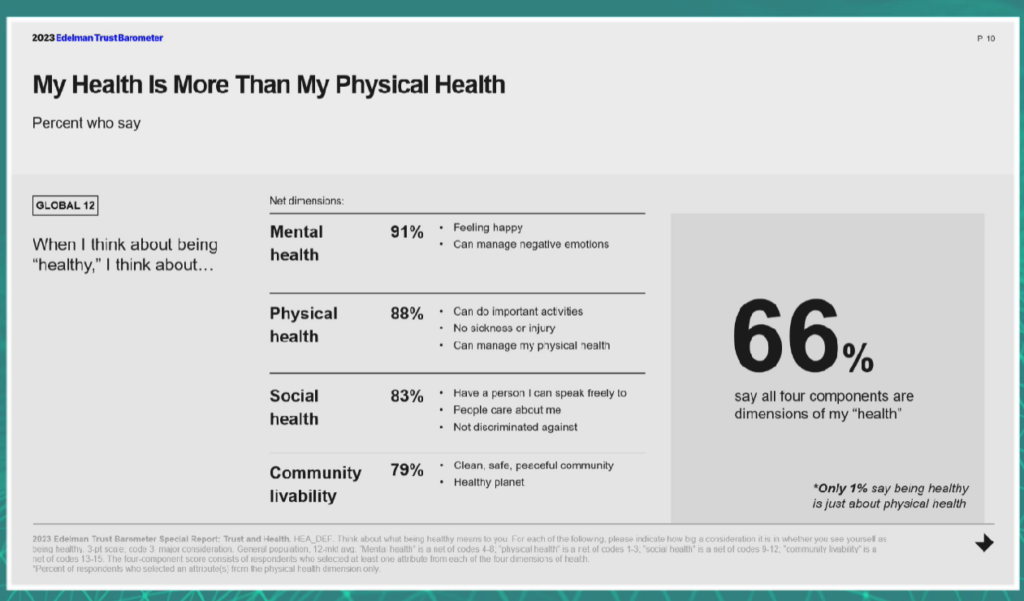
In 2023, combine economic fears, polarization and social alienation and we see, globally, that citizens’ mental health ranks higher on their personal list of well-being drivers than physical health, with social health and community livability ranking close third and fourth in line.
This self-definition is akin to the United Nation’s inclusive statement in its Constitution that, “health is a state of complete physical, mental and social well-being and not merely the absence of disease or infirmity.”
As the UN asserts late in its Constitution, “The health of all peoples is fundamental to the attainment of peace and security and is dependent on the fullest cooperation of individuals and States,” and that, “The achievement of any State in the promotion and protection of health is of value to all.”
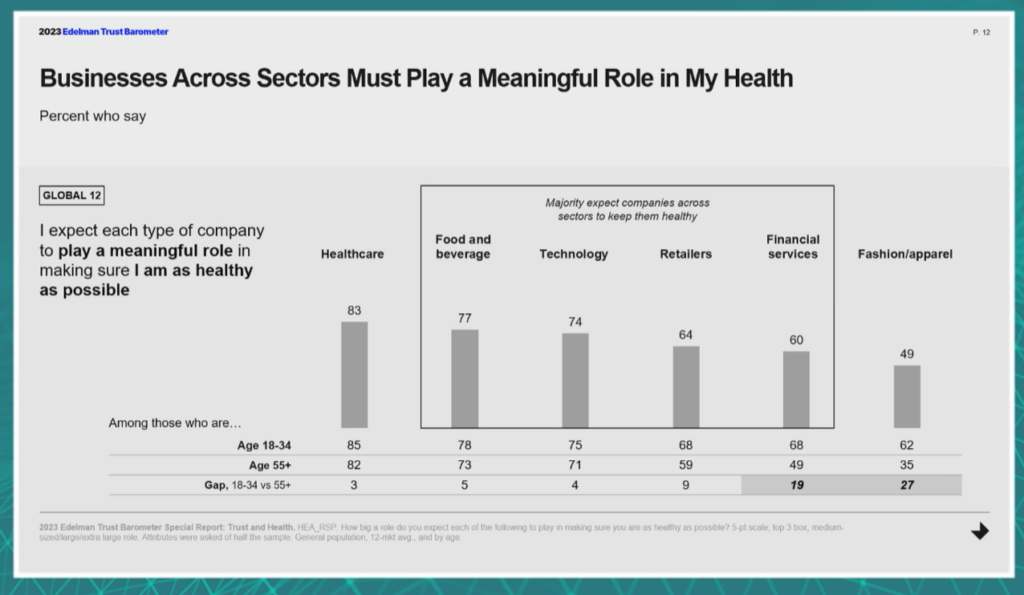
Health Populi’s Hot Points: We used to say, “all companies are tech companies” as e-business and the role of the Internet became merged with “just” business and everyday, mainstream work- and life-flows.
The pandemic ushered in a reality that all businesses and organizations took on health roles beyond providing health insurance for workers and staffing on-site employee clinics.
Today, the Edelman Trust Barometer reinforces the fact that “my” employer, and business overall, are expected to keep us healthy and tell us the truth about health care.
As such, every company is a health/care company, regardless of industry. We learned this in the early iterations of the Edelman Health Engagement Barometer over ten years ago, but the public health crisis solidified this in the minds of Everyday People. This last bar chart illustrates that people — now taking on the mantle of health citizens — believe that businesses, across industry sectors, must play a meaningful role in My Health — whether food and beverage, technology, retail, financial services, and for younger people, even the fashion industry.
To re-build trust, first, note that people want to be treated as their whole selves, mind, body, spirit, community. Four in 5 global consumers said that to feel cared-for by health care providers, they want to be treated for their holistic medical needs, including getting me the meds I need, following up after seeing me, and not making me wait too long to see me. 3 in 4 people want to feel their concerns are eased, including not feeling judged by the clinician. And, 2 in 3 citizens want to be cared-for as an individual, given recommendations that are personalized to “people like me,” and to be asked questions about their life.
Which is called “empathy,” as Dr. Adrienne Boissy has been guiding us for so many years.
Furthermore, we’re seeing more patients wanting to be equal partners in their health care: 60% say “include me in the science,” 62% want to be shown how recommendations fit into my life, and 67% say, “give me a voice.”
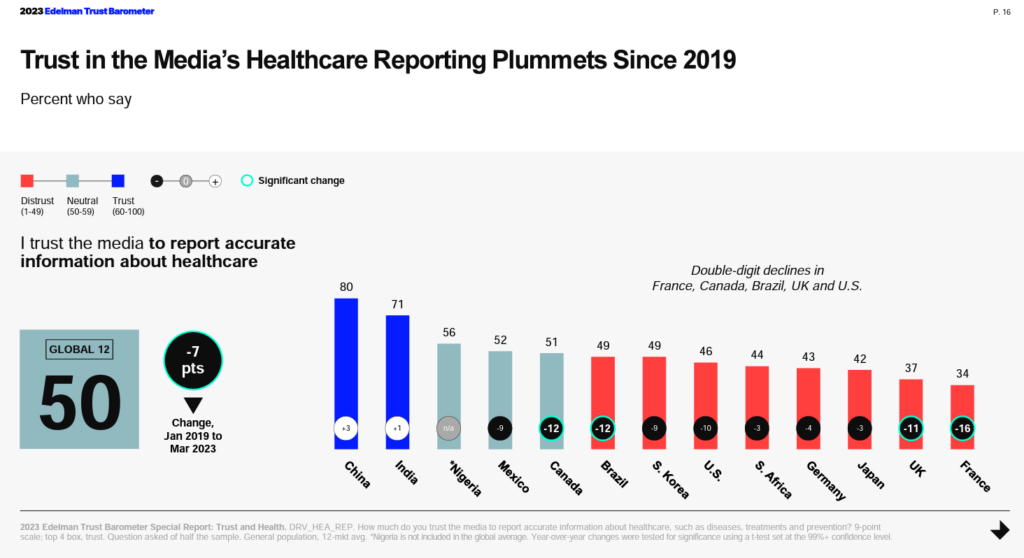
Bolstering that partnership is peoples’ growing self-education about health: since before the start of the pandemic, 3.5 times more consumers globally are educating themselves on health issues and 3 times more people are verifying whether the health information they see is true.
This begs the question, “where are these health-information-hungry researching consumers getting their “true” information?
It’s largely not via media, with only 50% of global consumers trusting that the media reports accurate information about health care.
In the U.S., that would be only 46% of health citizens, a double-digit decline in trust from June 2019.
Other factors to consider for those of us who want to work at re-building trust in health should focus on addressing health equity and societal issues that erode peoples’ access to affordable care; incorporate some folks’ super-trust in friends and family into communications strategies; and to make health central to products and business operations across all sectors.
Ultimately, respect, empathy, access, and affordable care are key ingredients in the prescription for rebuilding trust in health care systems.
I’ll finish with Richard Edelman’s call-to-action for us to unite on a Big Idea that reframes the health conversation: “We need a health goal equivalent to the net zero goal [struck] in Paris.”
We need a new compact between science and society, recognizing that the fifth force in social polarization is health, he assersted.
I’m all-in on that. Onward toward health citizenship!
I’ll leave you with Richard’s quote from Marie Curie:
Nothing in life is to be feared, it is only to be understood.
Now is the time to understand more, so that we may fear less.


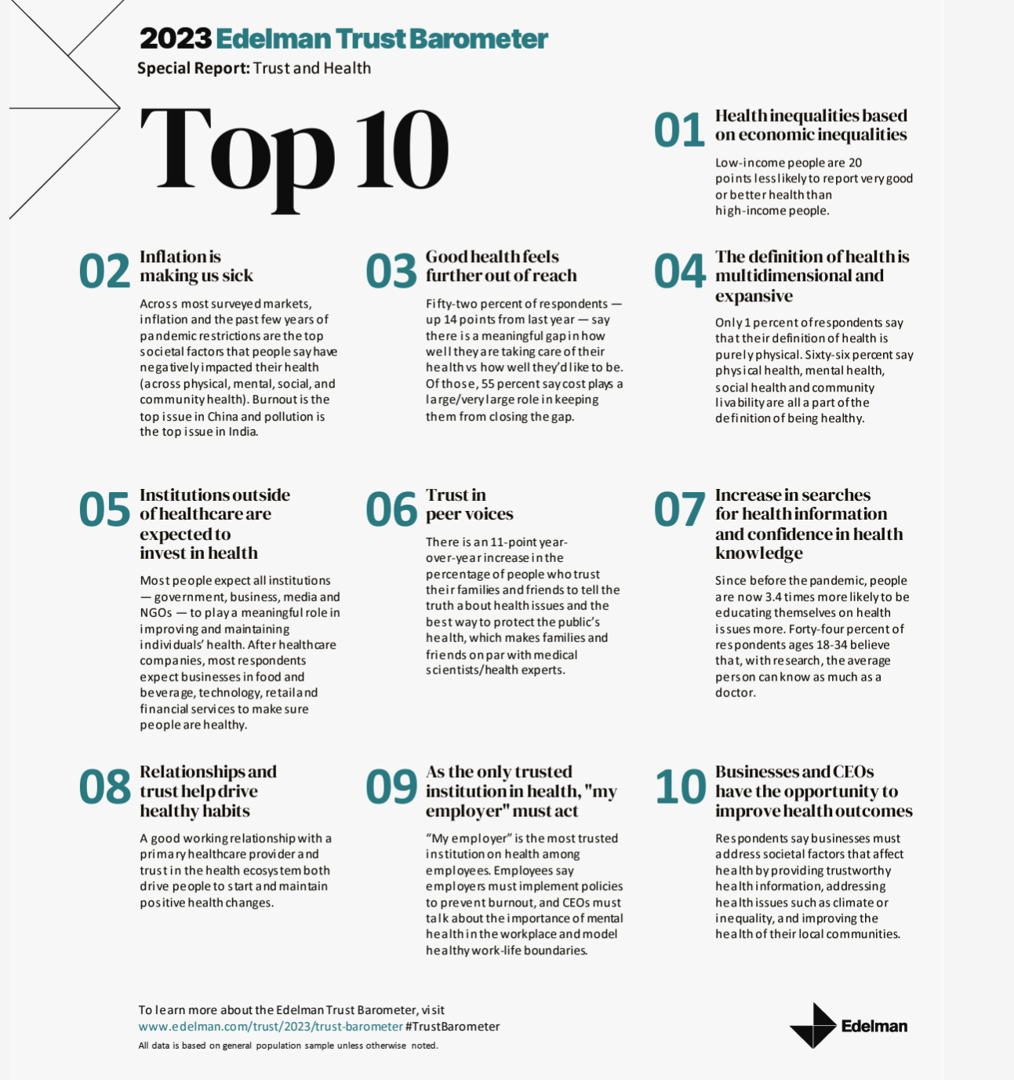


 I was invited to be a Judge for the upcoming
I was invited to be a Judge for the upcoming 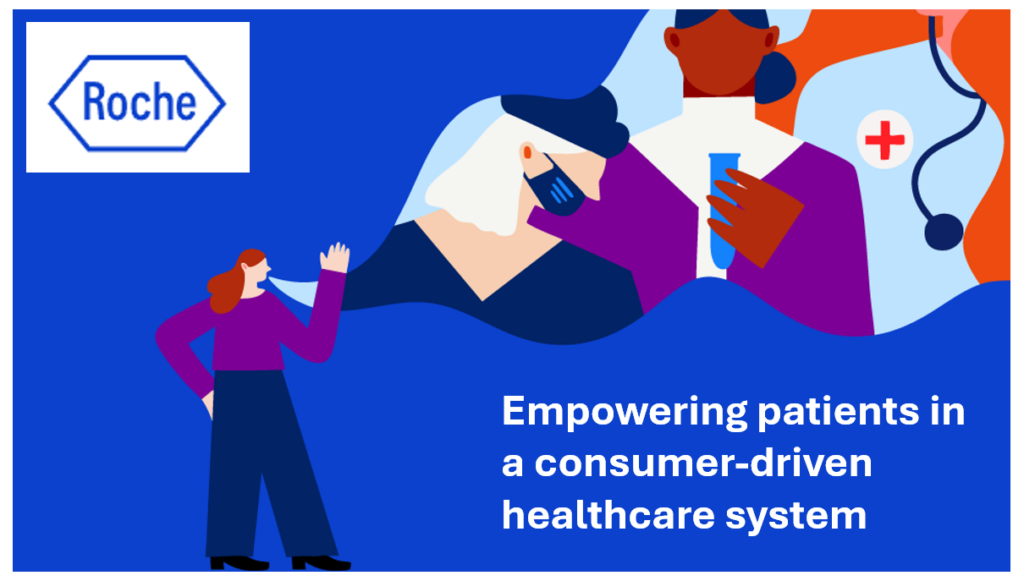 Thank you Team Roche for inviting me to brainstorm patients as health citizens, consumers, payers, and voters
Thank you Team Roche for inviting me to brainstorm patients as health citizens, consumers, payers, and voters  For the past 15 years,
For the past 15 years,